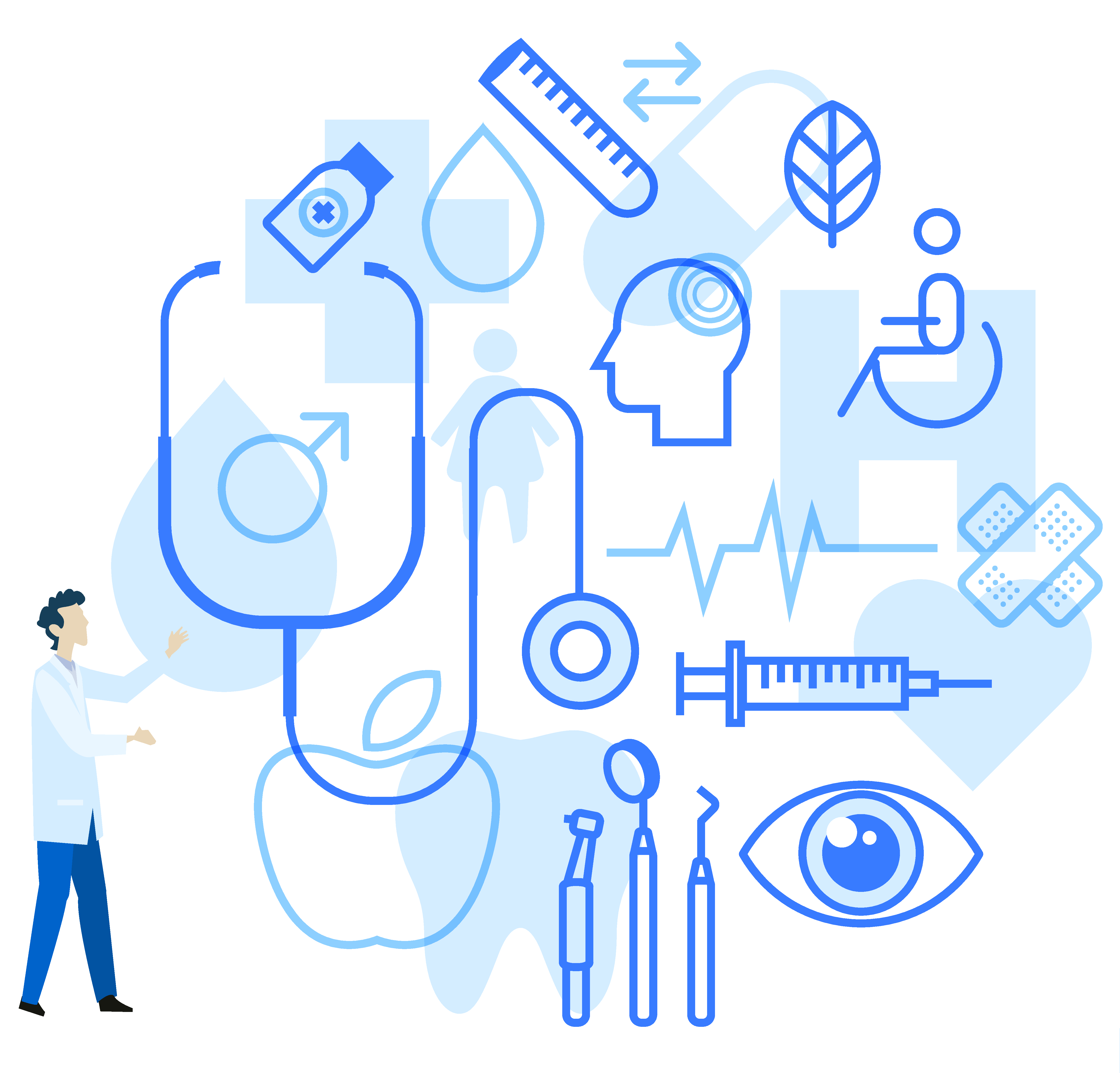EndlessMedical API supports 2000+ clinical data points grouped into 830+ features and over 180 diseases.
EndlessMedical API is one of the most advanced AI clinical diagnosis systems. It supports symptoms, signs, results of blood work, imaging, and physical examination findings - just to mention few categories of features.
EndlessMedical API technology
Patent pending methods create synthetic patient level data, which can be later used for AI/ML modeling.
EndlessMedical API doesn’t allow to input any patients identifying data, like date of birth, or name
With synthetic data there are significantly fewer concerns about patients’ privacy.
Our technology only processes de-identified numbers for numerical features (i.e. age, hemoglobin level) and labels’ identifying categories for categorical features.
EndlessMedical API, at any point, can suggest the next "best step” on diagnostic pathway
It may be next physical examination maneuver, next question to the patient, next blood test or imaging study to be done, which will most efficiently narrow down the list of likely diagnoses, recommended tests, and additional recommendations.
EndlessMedical API will produce explanation on why this "next step” is recommended
This feature of our modelling can be used to optimize the time of care by guiding providers through interviews, physical examination sessions, workup, and treatment processes in the most efficient way.
We hope this will allow providers and patients to avoid unwanted adverse events from unnecessary testing and save resources spent on unnecessary testing.
We hope this will allow providers and patients to avoid unwanted adverse events from unnecessary testing and save resources spent on unnecessary testing.
Diagnoses are flagged by, including “life-threatening emergency”, “high risk”, or otherwise.
This feature will allow providers to triage patients and suggest preparing billing and coding consistent with E/M guidelines.
Flags will allow call-center triaging and in person triaging the patients to right setting (office, telehealth, ER, urgent care) and correct specialist.
Flags will allow call-center triaging and in person triaging the patients to right setting (office, telehealth, ER, urgent care) and correct specialist.
Avoid being misled by big-data
How can we trust AI/ML modeling built on big-data when the research and experience repeatedly show that big data electronic medical record data is not trustworthy?
This especially matters when it comes to rare diseases. Our technologies can be used to model rare (i.e. orphan) diseases.
Read morePredicted list of differential diagnoses/diseases are further subcategorized into medical areas and specialties
This feature can refer patients to a specialist specific to patient's signs and symptoms.
Documentation generation happens in the background real-time and on-the-go, as your users use EndlessMedical API
EndlessMedical technologies allow for documentation of the entire patient encounters real-time on-the-go as patient is being seen by provider.
EndlessMedical technologies are capable to generate synthetic, individual patient-level data, and use it for AI/ML modeling.



Slide 2
Slide 2
The innovative technologies (USPTO # 20200118691, PCT/US2019/055747) employed by Endless Medical API enable the creation of a comprehensive knowledge database. This database comprises synthetic, patient-specific data generated from a combination of research, clinical expertise, and literature. It is highly recommended that individuals review the patent information to gain a thorough understanding of the benefits and drawbacks associated with EndlessMedical API technologies.
EndlessMedical API uses synthetic, individual patient-level data 
EndlessMedical API refrains from utilizing "big-data" due to its inherent drawbacks such as inaccuracy, errors, typos, biases, and concerns related to security, privacy, and data ownership. Instead, we employ synthetic patient-level data for AI/ML modeling, allowing us to address some of the challenges associated with big data.
Furthermore, we can ensure the utmost security and compliance* by hosting our products on HIPAA compliant, HITECH, SOC2 and SOC3, NIST, and PCI certified hosting platforms. (*if requested by our research partners).

The knowledge database and models of the EndlessMedical API are exclusively developed by Lukasz Kiljanek MD, who incorporates literature reviews whenever necessary. This knowledge can be readily adapted to different clinical environments, such as an intensive care unit or an emergency department, as per specific requirements.
In the future, the integration of data from multiple experts and diverse sources, including research papers, will be implemented to enhance the robustness of the medical knowledge database. This, in turn, will improve the sensitivity and specificity of the AI/ML models utilized by EndlessMedical API.

Big-data sets often fail to adequately represent rare diseases, resulting in an underrepresentation of such conditions. Conversely, they tend to overemphasize billable diagnoses and notable positive findings in physical examinations and medical histories, leading to a disregard for normal and negative findings.
Furthermore, obtaining big-data for research or commercial purposes requires costly and time-consuming Institutional Review Board (IRB) approvals.
While synthetic patient-level data is not without flaws, it can be a viable alternative to big-data in certain situations. Endless Medical API effectively utilizes synthetic patient-level data for AI/ML modeling, showcasing the practicality of this approach.
It's worth noting that large language models (LLMs) pose their own challenges. They are expensive to train or update and necessitate massive training corpuses. Additionally, it takes time for corpuses and knowledge to be published and made available for training LLMs.

The technologies utilized by Endless Medical API enable the creation of synthetic databases that accurately reflect the prevalence of diseases and clinical findings within specific environments.
For instance, the occurrence of strep throat in a general practice office differs from its occurrence in nursing homes. Traditionally, AI and ML models trained on data from one environment are not easily applicable to another. However, with EndlessMedical technologies, data can be effectively transposed from one environment to another, allowing for greater adaptability and flexibility.
